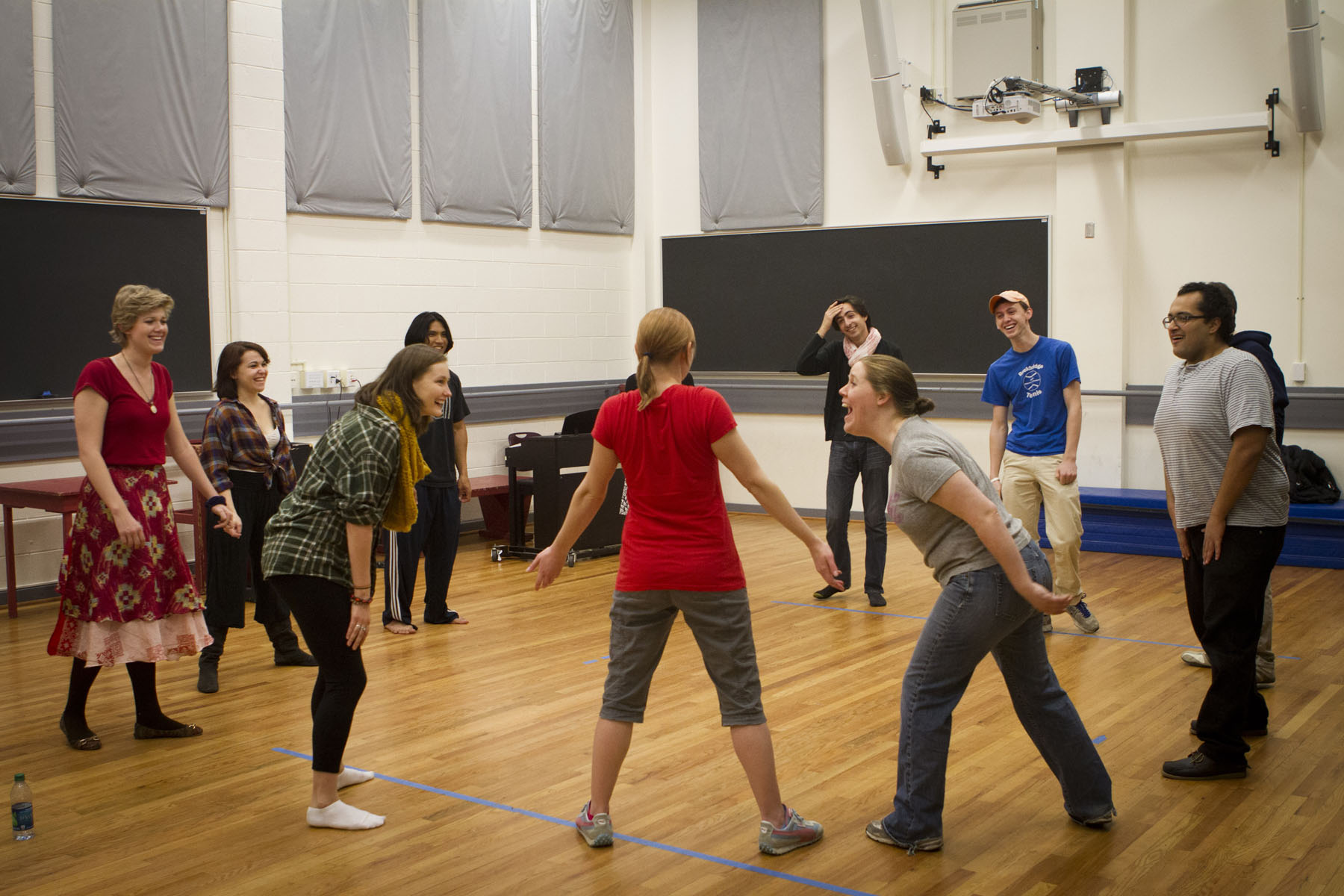For H. Caitlin McLeod, a production coordinator and assistant professor in stage management in the Department of Drama of the University of Virginia’s College of Arts & Sciences, a dream has come true. This fall, she received a Mead Endowment grant to create a “dream idea” project with her students.
The Mead Endowment was created in honor of U.Va. music professor emeritus Ernest “Boots” Mead to celebrate the University’s tradition of close student-faculty personal interactions. It allows faculty members to undertake interesting projects with undergraduate students that they might otherwise have been unable to pursue.
McLeod’s winning dream idea is to produce an undergraduate work of theater, transport the show to New York City and produce it for two nights in an off-off Broadway venue. This collaborative theater piece is being conceived, designed and rehearsed by McLeod’s students.
After several more rehearsals, the play – not yet titled – will be performed in an as-yet-undetermined New York theater on the evenings of Jan. 11 and 12, with no cost to the audience.
“The Mead grant project has handed us this really awesome, once-in-a-lifetime opportunity,” said Adam Santalla, a third-year drama major. “The fact that we will be graduating with this experience on our resume is unbelievable.”
In traditional theater, there is usually a strict delineation of roles in the acting, design and direction of a piece. With “devised theater,” the approach the U.Va. team adopted, the ensemble works together to develop a script, costumes, scenery, lighting and so forth.
The roles of participants are defined differently to give more developmental input to the actors and designers. For example, a designer may not perform, but might have input in the writing of the script. In short, the design responds to the work of the performers.
A typical devised theater process starts with the participants creating a contract of commitment with an agreed-upon timeline. Once logistics are set, the participants develop the work through brainstorming sessions and workshops. After several work sessions, the ensemble performs a “showing,” an informal presentation with a critique of the work-in-progress. Then the piece starts to take shape, hitting deadlines for script drafts and cut-offs for new material.
“We have a script now, but we’re probably going to throw a lot of it away,” said Whitney Wegman, a second-year MFA graduate student in acting. “Now we’re going to start doing improvisations to better understand and develop the characters.”
McLeod said she believes that increasing production costs have begun to create an unmanageable model in the theater industry, preventing theater practitioners from producing their work on a large scale. This shift has created a secondary path to the art for theater professionals through smaller productions, fostering a more collaborative and interactive model.
Several contacts in the New York theater world will be invited to the January performances, offering a showcase for the students’ talents to possible employers. McLeod is friends with a longtime producer of small-scale theater in New York who knows the venues and publicity outlets.
“The Mead grant has allowed us to just break out, go to New York and see how it works with a live audience,” McLeod said. “It just frees everything up.”
Currently, McLeod’s class is rehearsing once a week for three hours, with sessions becoming more intense as January approaches.
“I wanted to get as many people involved and have this be accessible to as many of our students as possible, so I kept the weekly rehearsal time to a bare minimum,” McLeod said.
Since her professional focus is stage management and coordinating productions, McLeod doesn’t often get the opportunity to develop a work from script through rehearsals to performance. As a production manager, it is her job to facilitate the creative process and make it move forward no matter what the content.
When work began on the theater piece, McLeod only asked the students to meet two requirements.
First, she wanted good to triumph over evil and for the audience to walk out of the show with a feeling of hope. “I don’t like Shakespeare tragedies where everybody’s dead at the end,” she said, laughing.
Second, she asked that there be some level of audience interaction as a way of engaging more with the piece, perhaps by dictating the action or dialogue or voting on a favorite character.
One unlikely inspiration for McLeod’s dream idea was the Charlottesville Ladies Arm Wrestling organization, which produces arm-wrestling events in which the audience bets charity dollars to determine who wins. Over the summer, McLeod attended the first Super CLAW championship, held at Charlottesville’s Jefferson Theater, and was impressed by its unscripted theatrical nature and how the experience was determined by the audience’s interactions.
“It was really inspiring to have this thing where you don’t know the ending,” McLeod said. “You’re presenting the audience with some options, and you’re going to have fun getting there.”
For the performance of the play’s debut in New York, students will cover their own travel, room and board. “We have a vast network of recent graduates in the city, and everyone agrees that there are enough couches to go around,” McLeod said.
As far as McLeod knows, U.Va. undergraduate drama students have never had the opportunity to create their own work as a company and then take it to New York.
“With this experience, we’re getting into the messiness of theater that, in an academic setting, you’re rarely presented with,” Santalla said.
Media Contact
Article Information
December 10, 2012
/content/mead-grant-allows-uva-drama-students-take-their-show-road

